Gain insights into the Bible's profound judgments, where divine justice and mercy intertwine, inviting a deeper exploration of morality.
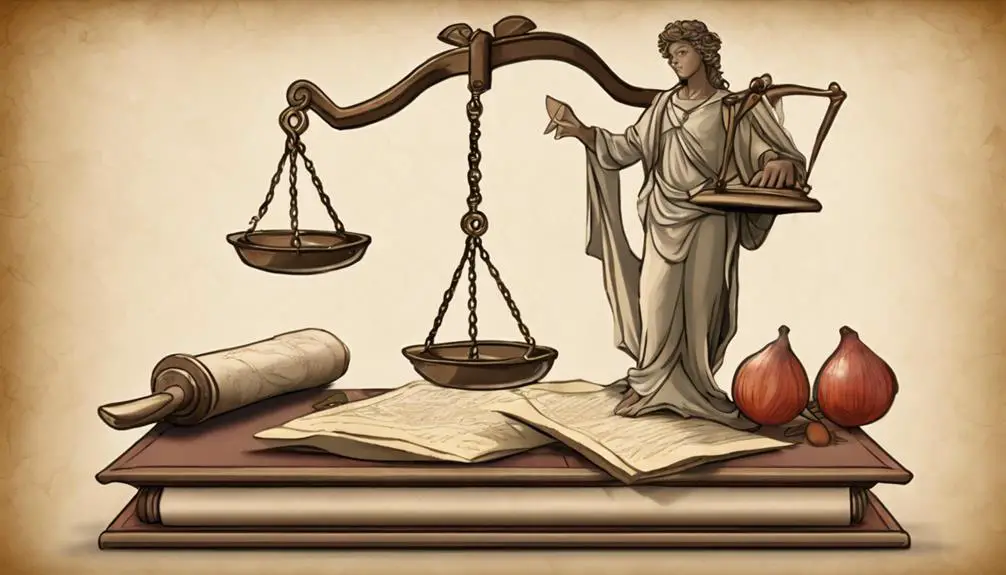
Judgements in the Bible
In the age of social media, the concept of judgment takes on a new dimension, yet the Bible has been exploring the depths of divine judgment long before the digital era.
You'll find that from the fall of Adam and Eve to the apocalyptic visions in Revelation, these narratives aren't just ancient tales but mirror the complexities of morality, choice, and consequence that resonate through ages.
As you explore these stories, you'll discover not just the severity of divine judgment but also the facets of mercy, redemption, and the enduring human struggle with right and wrong.
This journey might just change how you view the balance of justice and forgiveness in a world that's quick to judge.
Key Takeaways
- Biblical narratives emphasize divine judgment as a response to human disobedience and moral failure.
- Final judgment in Revelation highlights eternal consequences for actions, stressing the importance of righteousness.
- Stories of divine intervention serve as moral lessons on faith, obedience, and the redemptive power of righteousness.
- The dichotomy of heavenly rewards and eternal punishment reflects the biblical conception of moral accountability and divine justice.
The Fall of Adam and Eve
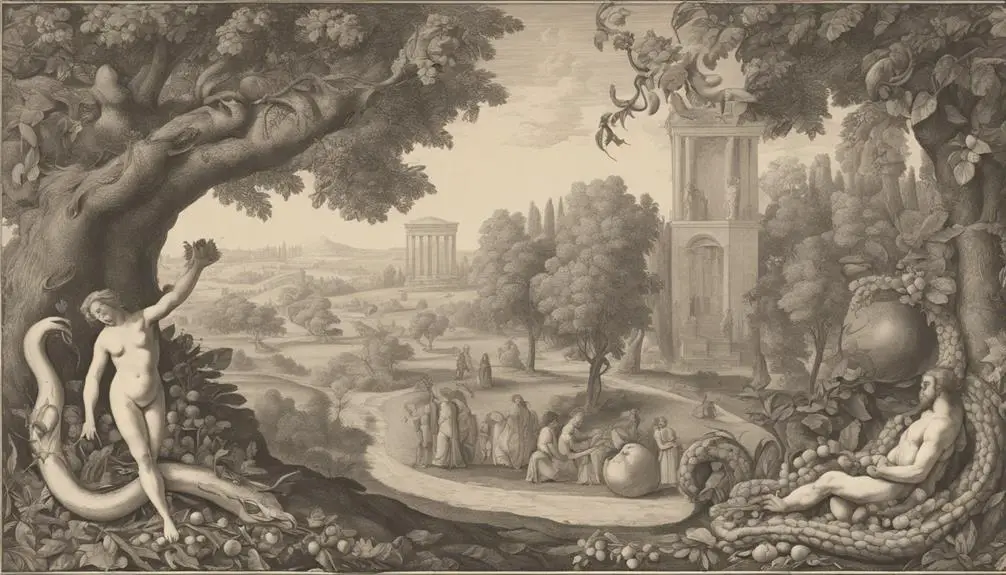
The narrative of Adam and Eve's fall in the Garden of Eden, as recorded in the Bible, marks a pivotal moment in theological history, inviting reflection on the consequences of human actions and divine judgment. Through this original sin, the story underscores a foundational theme: the profound impact of human choices in the face of temptation. The temptation narrative isn't just a tale of disobedience; it's a profound exploration of human nature, freedom, and the consequences that ripple through existence.
You're invited to consider the layers of meaning within this account. The act of eating the forbidden fruit, enticed by the serpent, symbolizes the first act of human will against divine instruction. This isn't merely about breaking a rule; it's about the awakening of consciousness, the emergence of moral and ethical dilemmas that define the human condition. Original sin, therefore, isn't just a mark of guilt inherited from ancestors; it's a reflection on the inherent complexity of being human, navigating between divine commands and personal desires.
Reflecting on this narrative urges you to ponder the intricate relationship between divine justice and mercy, and how these themes have been interpreted throughout theological discourse. It challenges you to think deeply about the nature of free will, temptation, and the eternal quest for redemption.
Noah and the Great Flood

Noah's story and the Great Flood serve as a profound narrative on divine judgment and human resilience, illustrating the consequences of widespread moral decay and the opportunity for redemption through obedience and faith. This biblical episode encapsulates a pivotal moment where the moral fabric of society is scrutinized, leading to a decisive divine intervention aimed at purging corruption.
The Ark construction, a monumental task assigned to Noah, symbolizes not only the impending salvation of humanity but also underscores the importance of steadfast faith in the face of impending doom. It's an architectural feat achieved through divine instruction, embodying the essence of divine-human cooperation in ensuring the continuity of life.
Moreover, the aspect of animal salvation emphasizes the comprehensive nature of divine judgment and redemption. It's a testament to the value placed on all of creation, highlighting a holistic approach to salvation wherein every species is deemed worthy of preservation. This narrative thread invites reflection on the interconnectedness of life and the responsibility humans hold towards other living beings.
Through Noah's unwavering obedience and the meticulous execution of Ark construction, the story of the Great Flood serves as a timeless lesson on the consequences of moral degradation and the redemptive power of faith and righteousness.
The Destruction of Sodom and Gomorrah
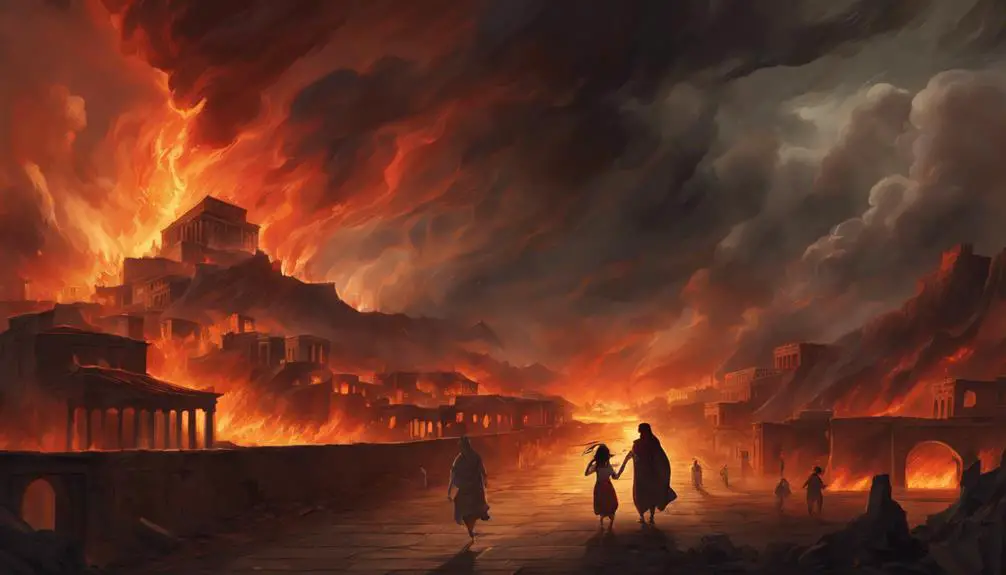
Moving from the narrative of Noah and the Great Flood, we encounter another profound biblical account of divine judgment in the destruction of Sodom and Gomorrah, highlighting the consequences of moral depravity and the limits of divine patience. This story isn't just a tale from the past; it's a complex narrative that intertwines faith, morality, and divine retribution.
Key aspects to consider include:
- Archaeological Evidence: While concrete proof remains elusive, potential sites near the Dead Sea have been explored, offering tantalizing clues about these ancient cities' existence and destruction.
- Ethical Interpretations: Scholars debate the ethical dimensions of this story, questioning the nature of the sins committed and the justice of the punishment.
- Divine Mercy: The negotiation between Abraham and God emphasizes divine mercy, suggesting that righteousness can spare the wicked.
- Historical Context: Understanding the cultural and historical context of ancient Near Eastern societies provides insights into the narrative's deeper meanings and the reasons behind divine judgment.
This account challenges you to reflect on the complexities of divine justice, human morality, and the consequences of our actions. It's a narrative that, through its layers and interpretations, continues to provoke thought and discussion on ethical and spiritual dimensions.
Moses and the Ten Plagues
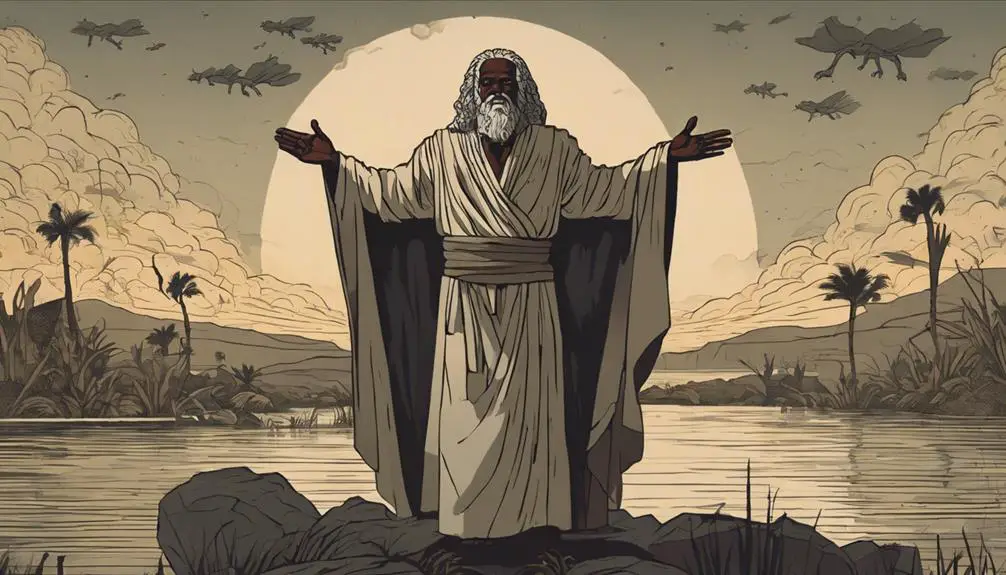
Within the narrative arc of divine intervention, Moses' confrontation with Pharaoh through the Ten Plagues stands as a pivotal moment of judgment against Egypt's oppression of the Israelites. This sequence of events highlights Pharaoh's stubbornness against divine will, showcasing a profound battle not just of wills, but of ideologies. Each plague, from the Nile turning to blood to the death of the firstborns, serves as a miraculous intervention, systematically dismantling the Egyptian pantheon and asserting the supremacy of the Israelite God.
These plagues weren't mere acts of retribution; they were lessons in humility and power, aimed directly at the heart of Egyptian arrogance. Pharaoh's resistance to Moses' demands underlines a critical aspect of human nature: the reluctance to relinquish control, even in the face of undeniable evidence of a higher power. The plagues, therefore, aren't just punishments but also revelations, revealing the limitations of human authority and the boundless might of the divine.
As you reflect on this story, it's imperative to consider its implications on faith, obedience, and the consequences of defiance. The narrative of Moses and the Ten Plagues is a profound exploration of divine judgment, emphasizing the inevitability of justice through miraculous interventions.
The Prophets and Divine Warnings
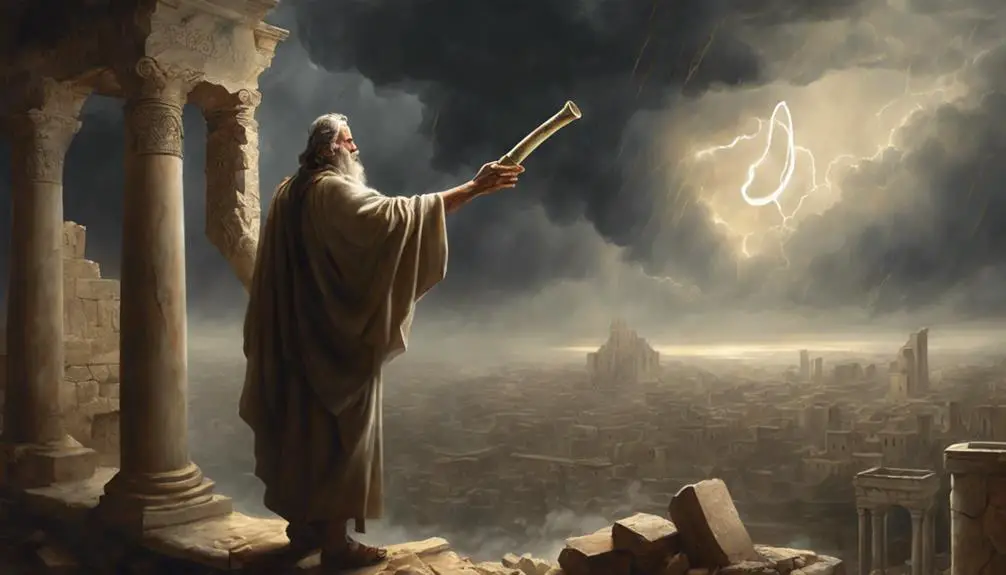
Shifting focus from Moses' era of direct divine intervention, we now explore the role of prophets as bearers of divine warnings, a nuanced form of judgment aimed at guiding communities back to righteousness. The prophets, chosen by the divine, played a pivotal role in shaping the moral and spiritual fabric of society. Their warnings weren't mere predictions of doom but rather calls to reflection and change, embodying a profound understanding of divine interventions in human affairs.
- Prophetic Roles: They served as intermediaries, conveying messages from the divine to the people. Their role wasn't just to foretell future events but to urge society towards ethical conduct and adherence to divine laws.
- Divine Interventions: Through these messengers, the divine offered guidance and correction, demonstrating a continuous engagement with humanity's moral progress.
- Calls to Repentance: Prophets often warned of consequences for societal sins, emphasizing the possibility of forgiveness and redemption through sincere repentance.
- Signs and Wonders: Accompanying their words, signs and wonders often validated their prophetic messages, reinforcing the seriousness of their divine warnings.
In this framework, prophets stand as timeless figures, their messages echoing the persistent divine effort to steer humanity towards a path of righteousness and reflection.
The Final Judgment and Revelation
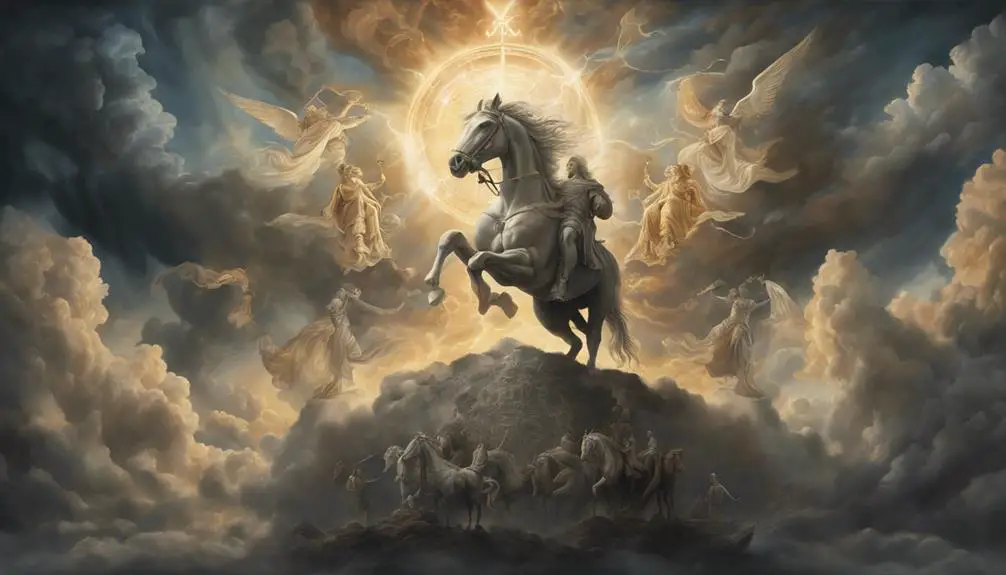
Transitioning from the role of prophets, we encounter the notion of the Final Judgment and Revelation, pivotal themes that encapsulate the culmination of divine interaction with humanity. You find yourself delving into a complex, yet profoundly significant, eschatological framework within the biblical narrative. This doctrine isn't merely about the end times; it reflects a divine assessment of human deeds and their eternal implications.
The Final Judgment, as detailed in Revelation, marks a decisive moment where every individual faces divine scrutiny. It's here you grasp the gravity of heavenly rewards and eternal punishment, concepts that underscore the moral dualism inherent in biblical teachings. Heavenly rewards are portrayed as the ultimate acknowledgment of faithfulness and moral integrity, promising an eternal communion with the divine. In contrast, eternal punishment is depicted as the consequence for those who stray from divine commandments, emphasizing the seriousness of moral failings.
This dichotomy serves not only as a future expectation but also as a present guide, urging you to reflect on your actions and their alignment with divine will. The Final Judgment and Revelation, thus, stand as a testament to the overarching biblical theme of divine justice, urging humanity towards a path of righteousness and moral accountability.
Frequently Asked Questions
How Do Biblical Judgments Reflect on Modern-Day Legal Systems and Their Foundational Principles?
You'll find that modern legal systems and their foundational principles often draw from ancient moral codes, with legal precedents sometimes reflecting age-old wisdom.
These systems, developed over centuries, incorporate ethical guidelines that govern behavior and ensure justice. By analyzing how these principles are applied today, you'll recognize the influence of historical judgments on contemporary law.
This perspective offers a reflective understanding of the intricate relationship between past wisdom and current legal frameworks.
What Psychological Impacts Do the Stories of Biblical Judgments Have on Believers and Non-Believers Alike?
Imagine yourself diving into tales that grip your psyche tighter than a thriller at midnight. These stories, brimming with moral resilience and psychological authority, shape how you see the world.
For believers, they're a roadmap to spiritual fortitude; for non-believers, a fascinating study in human belief systems.
Analyzing them, you're not just reading ancient texts; you're uncovering layers of psychological impact, reflecting on personal beliefs and societal norms.
How Have Interpretations of Biblical Judgments Influenced Art and Literature Throughout History?
Interpretations of historical texts have deeply influenced art and literature, embedding artistic symbolism and literary motifs into our cultural fabric.
You'll find that artists and writers often draw upon these narratives, reflecting societal values and beliefs.
This embedding process enriches the complexity of human expression.
As you delve into these works, you'll uncover layers of meaning, revealing how interpretations have shaped our collective imagination and understanding across centuries.
In What Ways Have Different Denominations of Christianity Interpreted the Outcomes of These Judgments Differently?
Diving into the heart of interpretative diversity, you'll find that different Christian denominations unfold the fabric of divine sovereignty in their own unique patterns. Each thread reveals a distinct perspective on how divine decisions shape humanity's path.
This tapestry of beliefs highlights the rich, complex nature of faith, inviting you to reflect on the profound ways these interpretations influence understanding and dialogue within the broader Christian community.
How Do Biblical Judgments Address or Fail to Address the Concept of Forgiveness and Redemption in Contrast to Punishment?
When you delve into the essence of divine justice, you're exploring a realm where forgiveness and redemption often intertwine with punishment. This approach doesn't merely serve as a moral compass; it challenges you to reflect on the balance between mercy and justice.
Biblical narratives, while diverse, consistently prompt you to consider how these concepts are addressed or sometimes overlooked, pushing the boundaries of your understanding of ethical and spiritual accountability.
Conclusion
In analyzing the biblical judgments, you've journeyed through epochs, witnessing divine intervention from the dawn of humanity to apocalyptic visions. These narratives, though ancient, resonate with timeless themes of morality, justice, and redemption.
Interestingly, they're akin to browsing through history's ultimate playlist, each story a track echoing lessons for humanity. Reflecting on these, one can't help but ponder the profound implications for modern ethics and spirituality, inviting a continuous dialogue between past wisdom and present challenges.

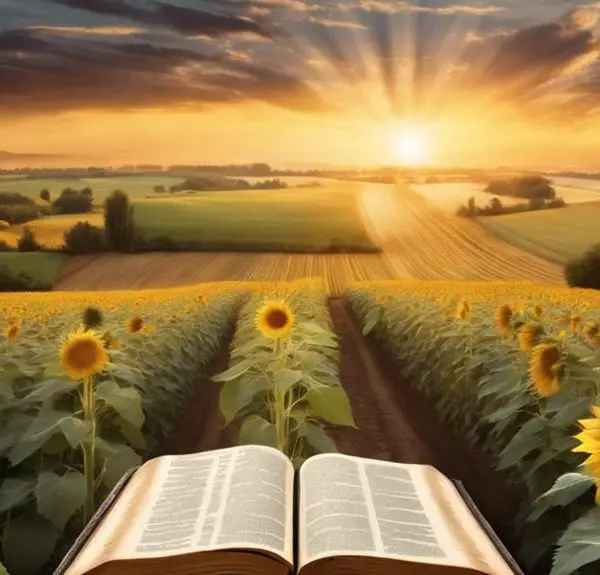

Sign up